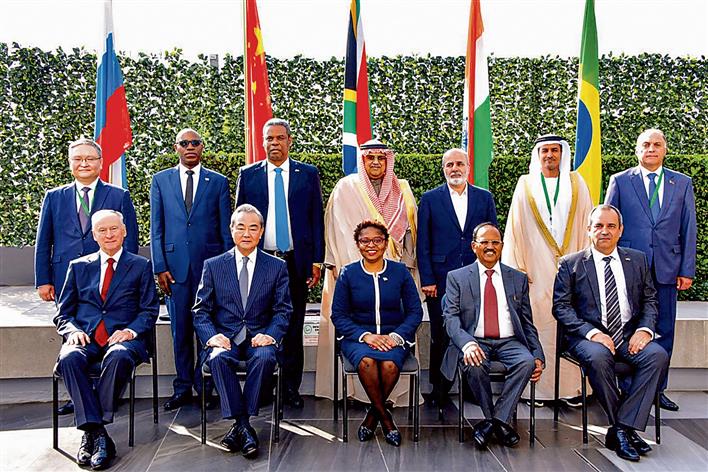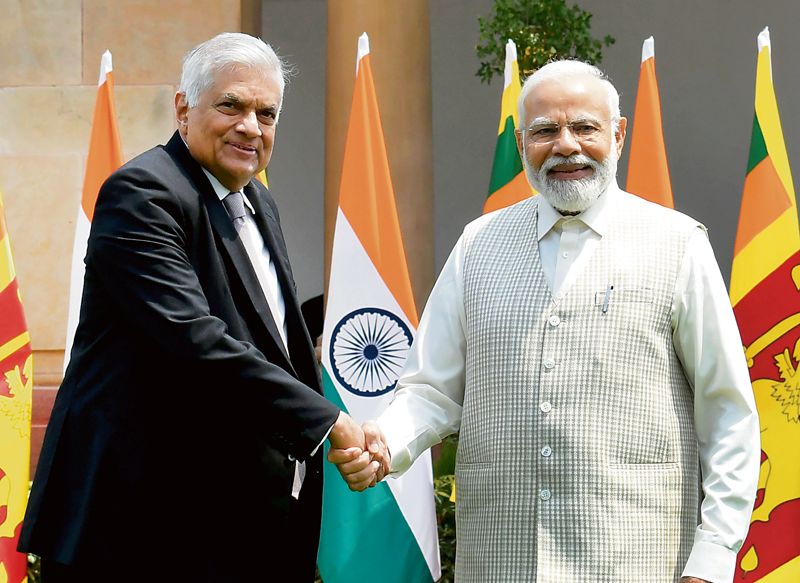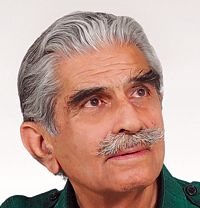







Sandeep Dikshit
New Delhi, July 25
National Security Adviser (NSA) Ajit Doval emphasised to the Chinese side the importance of continuing efforts to fully resolve the situation and restore peace and tranquility in the border areas in order to remove impediments to normalcy in bilateral relations.
In a meeting in Johannesburg with Wang Yi, Politburo member of Chinese Communist Party and Director of its Foreign Affairs Commission, Doval conveyed that the situation along the LAC in the Western Sector of the India-China boundary since 2020 had eroded strategic trust and the public and political basis of the relationship, stated an MEA readout.
Meeting on the sidelines of the BRICS NSAs’ Meeting in Johannesburg on Monday, this was the second meeting within a month between Wang and India’s security managers, leading the western media to speculate that Sino-India ties seem to be on the mend. Earlier this month, Wang had met with External Affairs Minister S Jaishankar on the margins of an ASEAN meeting in Jakarta.
During the meeting, the two sides agreed that the India-China bilateral relationship is significant not only for the two countries but also for the region and world, added the MEA readout.
Wang called for policies to “enhance strategic mutual trust” and “focus on consensus and cooperation”, said a Chinese Foreign Ministry readout which also quoted Doval as stating that “the destiny of the two sides is closely linked and it is necessary to rebuild strategic mutual trust and seek common development”.
Doval also met the Secretary of the Security Council of the Russian Federation Nikolai Patrushev and discussed bilateral cooperation on security issues and in the field of the economy, said a Russian readout.


SRI Lanka’s rulers have historically relied on India for security and on China for economic assistance. Last year, the reverse happened, with China staying aloof during Sri Lanka’s economic crisis.
Last week, Sri Lankan President Ranil Wickremesinghe was on his first visit to New Delhi since assuming office last July after the then President Gotabaya Rajapaksa was ousted by a people’s uprising amidst an economic collapse that saw India emerging as the saviour. Wickremesinghe was here to thank India, his country’s too-close-for-comfort big neighbour. India came up with timely monetary assistance of $4 billion. When Colombo had sought military aid with its back to the wall in Jaffna in 2000 while battling the LTTE, India had provided it $500 million.
While a $3-billion International Monetary Fund (IMF) bailout will help Sri Lanka tide over its economic woes, it’s the political situation that has not really changed. Although the Rajapaksas — the victors in the war — have been hounded out, their party, the Sri Lanka Podujana Peramuna (SLPP), still calls the shots. Six-time Prime Minister Wickremesinghe, the lone nominated MP of the United National Party, was elected by the parliament as President with the support of SLPP MPs. There is a perception that the President and the government lack political legitimacy as geoeconomics has trumped geopolitics.
The provincial council and local government elections have not been held for more than four years as the government fears an electoral rout. While the President’s term ends in November 2024, the parliament’s tenure will expire in 2025. Though Article 21A has restored constitutional councils, the powers of the President (restored by Gotabaya) have not been curbed as promised. At the Human Rights Council’s March session in Geneva, Sri Lanka made renewed promises on addressing war crimes and human rights violations as a part of national reconciliation. Wickremesinghe had promised to resolve the Tamil National Question, first by February 4, 2023, and then by the year-end. His latest offer of implementing 13A (13th Amendment to the constitution) sans police powers was rejected by the Tamils.
Before the Wickremesinghe visit, Sri Lanka’s Ambassador in New Delhi Milinda Moragoda had admitted that its debt trap was of its own making and that India had helped in getting the IMF loan. On July 8, House Speaker Mahinda Yapa Abeywardena thanked India for saving Sri Lanka and preventing a bloodbath during its unprecedented economic crisis last year. In 2022, India extended a multi-pronged assistance of $4 billion to Sri Lanka through multiple credit lines and currency support, in line with India’s ‘Neighbourhood First’ policy. Sri Lanka’s payback has been stingy, especially after its standoffish behaviour in cancelling the India-Sri Lanka-Japan joint venture in the East Container Terminal (ECT) at the Colombo Port, delaying the Trincomalee oil tank farm deal and the Sampur renewable energy project. It crossed a red line in awarding a contract to a Chinese firm to construct a hybrid solar and wind project off the coast of Jaffna; it later rescinded the decision and gave the project to India.
The West Container Terminal at the Colombo Port was later given to the Adani Group, which also won the controversial wind farm contract in Mannar that rocked the parliaments of both countries. Another ticklish issue was Wickremesinghe initially refusing but later permitting a Chinese surveillance ship, Yuan Wang 5, to dock in the veritably China-owned Hambantota Port. In 2013, a Chinese nuclear submarine (Colombo insists that it was a conventional submarine) berthing in he Colombo Port had caused a ruckus.
Sri Lanka’s economy has shrunk by 7 per cent and will contract by another 3 per cent this year. The IMF-imposed unpopular measures, such as cutting subsidies, increasing taxes and privatising state enterprises, have flattened the economy. Integrating the Sri Lankan economy with that of India can steer Colombo towards recovery.
At his briefing to the media on the outcome of President Wickremesinghe’s visit, Foreign Secretary Vinay Mohan Kwatra said the vision document for economic partnership highlighted multi-connectivity — land, air, maritime, energy, power, trade and financial transactions. Kwatra added that negotiations on the Economic and Technology Cooperation Agreement would resume so as to replace the existing trade deal. He refused to comment on the West Container Terminal given in lieu of the cancelled ECT, referring to the involvement of private players.
The new framework agreement on Trincomalee is based on the previous agreement of January 2022 for making it the regional energy hub. The joint development of 61 of the 99 oil tank farms by the Lanka Indian Oil Corporation and the Ceylon Petroleum Corporation is included in a 50-year development plan. Wickremesinghe has appointed former CDS Admiral Ravi Wijegunaratne as Managing Director, Ceylon Petroleum Corporation, and Chairman, Trincomalee Petroleum Terminal. The strategic Trincomalee harbour is highly valued by India and a long-term presence is vital to keep China at bay. Beijing’s interests in the region extend to the Indian Ocean and, hence, it has invested in projects in the Colombo Port and Colombo Port City and has a 99-year lease on the Hambantota Port.
At this month’s India CEO Forum, Wickremesinghe spoke about fostering long-term relations between the two countries and aligning Sri Lanka’s path with India as it had undergone an economic transformation and it was now ‘India time in the Indian Ocean Region’. Speaking to France24 this month, he said: “Lanka is neutral; there is no military agreement with China and we will not allow the use of our soil for any threat against India.” The Indian Ocean may not be ‘India’s Ocean’, but geography enables both India and Sri Lanka to play a vital role in its peace and stability.
Prime Minister Narendra Modi encapsulated the bilateral relations: “We believe the security interests and development of India and Sri Lanka are intertwined. And, therefore, it is essential that we work together keeping in mind each other’s safety and sensitivities.” He also emphasised on what has become standard practice during India-Sri Lanka talks — the Tamil aspirations, meaningful devolution of power and full implementation of 13A. This has become India’s bottom line.

Patiala, July 25
With the onset of monsoon, it is time for Jagir Kaur’s family at Lacchru village to shift to the first floor of their house, fearing the floodwaters of the raging Ghaggar. The kitchen has to be moved as spillover from the swollen river gushes in. This year has been the worst, Jagir says, adding that her family had to be rescued on boats, leaving behind cattle and furniture.
Land prices remain low
“Land in some villages near the Ghaggar is still priced around Rs 20 lakh an acre, the same price it fetched 15 years ago. There are still no takers for the land,” said a politician who himself suffered crop damage in over 30-acre land in Ghanaur.
Residents living near the Ghaggar say monsoon floods are a biennial, if not an annual, event here. “This river is a curse for us. Apart from hitting us with floodwater, it leads to the spread of diseases and causes deaths of cattle,” a villager said.
The damage caused by the river has also led to a major social disruption. Villagers in the Ghaggar catchment areas say they find it difficult to get a match for their boys as no one is willing to marry their daughters in villages where floods are a constant threat.
“My brother owned 15 acres of land, but it took a lot of efforts to get him married as people are reluctant to send their daughters to our village, which is the first to be affected by monsoon floods. Eventually, we had to marry him to a girl from another flood-hit village of Hassanpur Mangta,” said Kulwinder Singh, a resident.
“Given a choice, we would want to be reborn anywhere away from this river of grief. Our paddy crop was washed away within hours this year and there is no chance to re-sow paddy saplings as the silt brought by floodwater is still in my fields,” said Mahinder Singh of Ghanaur.
An expert from the Irrigation Department said with time, the spread of the river has shrunk due to illegal encroachments and widespread digging. Land prices are low and illegal mining in Ghanaur has only added to the misery of residents living near as the river bank, he added.
Chandigarh, July 25
The Chandigarh Municipal Corporation House on Tuesday approved free parking for two-wheelers and electric vehicles (EVs).
However, car parking charges will be Rs 15 for four hours. For parking up to 8 hours, Rs 20 will be charged. After that, Rs 10 will be charged per hour.
In a blow to outstation vehicles, double charges will apply for cars registered outside tricity. All rates will be applicable once Fastag-based smart parking system is introduced.
At present, Rs 7 is the rate for two-wheelers and Rs 14 for cars. These are flat charges.
Rs 70 will be charged for car parking at Elante mall for hours and Rs 130 will charged between 4 hours and 8 hours. After that charges of Rs 20 will apply per hour. Here also, vehicles from outside tricity will have to pay double.

New Delhi, July 25
As many as 44 per cent Lok Sabha members and 31 per cent Rajya Sabha members have criminal cases pending against them while 43 per cent state legislators face criminal cases, the Supreme Court has been informed.
In his latest report filed in the top court, amicus curiae and senior advocate Vijay Hansaria submitted that 5,097 cases were pending against MPs/MLAs, of which over 40 per cent (2,122 cases) were pending for over five years.OUR
Hansaria’s report stated that 236 of 542 LS members (44 per cent), 71 of 226 RS members (31 per cent) and 1,723 of 3,991 state legislators (43 per cent) had criminal cases pending against them.

PM Narendra Modi with Rajnath Singh, Pralhad Joshi, Arjun Ram Meghwal and Jitendra Singh after BJP’s parliamentary party meet. MANAS RANJAN BHUI
https://cdn.vuukle.com/widgets/audio.html?version=1.1.1
Advertisement
New Delhi, July 25
As Nagaland failed to implement one-third reservation for women in the civic body elections, the Supreme Court on Tuesday rapped the Centre and the state government for being unwilling to implement the Constitution.
“You will take an extreme stand against state governments which may not be amenable to you. Your own state government is violating the constitutional scheme and you don’t want to do anything. How can you wash your hands of it?” a Bench led by Justice SK Kaul told Additional Solicitor General KM Nataraj, who represented the Centre. The BJP is a partner in the coalition government led by the Nationalist Democratic Progressive Party in Nagaland. The urban local body elections have been long overdue in the state where the last elections were held in 2004.


Noting that Nagaland was a state where women actively participated in every aspect of life, the Bench said the Centre could not preclude reservation from being extended to women in civic bodies by saying it did not apply to tribal areas. The Bench, however, clarified that it was not interfering with the customary laws of Nagaland.
“This is a state where education, economic and social status of women is among the best. Thus our concern is why reservation for women can’t be implemented,” it noted.
The top court was hearing a petition by the People’s Union for Civil Liberties and others seeking 33 per cent quota for women in Nagaland in the local bodies’ elections. They had moved the top court against the cancellation of the elections and wanted contempt action against the state for “disobeying” its order.
The top court had on April 5 stayed the March 30 notification cancelling till further orders the elections to the urban local bodies in Nagaland, which were scheduled for May 16 after almost two decades. The Nagaland Assembly had passed a resolution to repeal the municipal Act and resolved not to hold the elections after Naga tribal bodies and civil society organisations opposed elections to the urban local bodies under the Nagaland Municipal Act, 2001, asserting that it infringed upon the special rights of Nagaland guaranteed by Article 371A.
Your state govt violating constitution
You will take an extreme stand against state governments which may not be amenable to you. Your own state government is violating a constitutional scheme. — SC Bench






















































